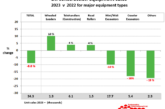The government should use the two-year pause on new construction work at HS2 Euston to develop a design that is affordable, deliverable and value for money, according to a new National Audit Office report.
In March 2023, following an announcement by the Transport Secretary, the Department for Transport (DfT) deferred work on HS2 Euston and Phase 2a (Birmingham to Crewe) due to inflationary pressures. At Euston, HS2 Ltd also reported in March 2023 that the latest cost estimate for the 10-platform design is £4.8 billion, £2.2 billion more than its budget.
In January 2020 the NAO reported that the work at Euston was more complex than originally anticipated and that there was uncertainty over the HS2 station design.
The following month the Oakervee Review raised concerns about the design of the HS2 Euston station and concluded that the existing design was unsatisfactory.
In April 2020 HS2 Ltd set a budget of £2.6 billion for the HS2 Euston station, but by June 2020 it estimated that it could cost as much as £4.4 billion.
In November 2020, the DfT instructed HS2 Ltd to pause construction on the 11-platform design to begin work on a new 10-platform plan. These new plans are now £0.4 billion more expensive than the previous 11-platform design. In Autumn 2021 the Department also directed HS2 Ltd to integrate more closely with Network Rail’s redevelopment of the existing rail station and confirmed the extent of the surrounding commercial and residential developments. Much of the previous design work was then scrapped, at a cost of £106 million to the taxpayer, despite DfT’s efforts to minimise this.
To help with this integration, and in response to the Oakervee recommendations, in December 2021 the DfT formally established the Euston Partnership to bring together the different bodies involved with projects on the Euston site, including delivery of HS2 Euston station.
Following the Transport Secretary’s announcement in March 2023, the DfT will now need to consider how best to control the budget while developing an affordable and deliverable design.
The two-year pause in new construction will see spending deferred in the short-term but lead to additional costs and potentially an overall increase in costs in the long-term. This is due to costs associated with stopping and re-starting work, contractual changes, and managing the project for longer.
By the end of December 2022 HS2 Ltd had spent more than £2 billion on the HS2 Euston station and its approaches, including design, land, and preparatory works. The land purchases and preparatory works cost £1.5 billion and were funded from the wider HS2 budget. Budget pressures on HS2 Euston station have now been compounded by significant inflationary pressures across DfT’s capital programme. In the first instance, HM Treasury (HMT) requires the DfT to absorb inflationary pressure, which has risen significantly since the forecast in 2020, within its existing cash budget.
The NAO’s report recommends the DfT works with the Euston Partnership, HS2 Ltd, Network Rail, Lendlease and local partners to reassess the expectations for the HS2 Euston project, its budget, and the public benefits. It also suggests setting out clear aims and measures as part of the programme reset and applying the lessons it has learned to HS2 Manchester stations and other parts of the programme.
Gareth Davies, the head of the NAO said: “Government is once again having to revise plans for Euston HS2. Clearly, the 2020 reset of the station design has not succeeded. DfT and HS2 Ltd have not been able to develop an affordable scope that is integrated with other activity at Euston, despite their focus on costs and governance since 2020. Recent high inflation has added to the challenge.
“The March 2023 announcement by the Transport Secretary pausing new construction work should now give DfT and HS2 Ltd the necessary time to put the HS2 Euston project on a more realistic and stable footing. However, the deferral of spending to manage inflationary pressures will lead to additional costs and potentially a more expensive project overall, and that will need to be managed closely.”









